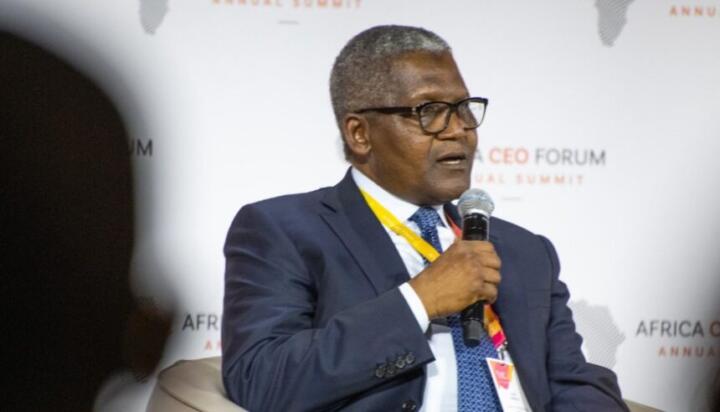The Dangote Petroleum Refinery has announced that more than 310 million litres of Premium Motor Spirit (PMS), commonly known as petrol, are now available and ready for loading as part of the facility’s phased distribution rollout. The company disclosed that this development marks a significant step toward achieving Nigeria’s goal of domestic self-sufficiency in refined petroleum products and reducing reliance on imports.
In a statement issued by the Dangote Group, the refinery’s management revealed that the product, which meets international quality standards, has passed all regulatory tests conducted by relevant government agencies, including the Nigerian Midstream and Downstream Petroleum Regulatory Authority (NMDPRA). The company noted that the refined petrol will be distributed to both local marketers and export destinations in the coming weeks.

According to the Group’s Executive Director, Strategy, Capital Projects and Portfolio Development, Mr. Devakumar Edwin, the refinery has been operating at increased capacity in recent months, refining various grades of crude oil sourced from both local and international suppliers. He confirmed that the loading of petrol tankers will commence shortly after final logistics arrangements and coordination with major distribution partners are completed. “We have refined and stored over 310 million litres of PMS in our tanks, ready for loading and distribution. This is part of our commitment to stabilise fuel supply in Nigeria and across West Africa,” Edwin said.
The Dangote Refinery, located in Ibeju-Lekki, Lagos, is Africa’s largest integrated refining facility with a capacity of 650,000 barrels per day. The plant began diesel and aviation fuel production earlier in the year and has since expanded its operations to include petrol. The refinery is expected to play a crucial role in supporting Nigeria’s energy security and reducing the foreign exchange burden associated with fuel imports.
Industry stakeholders have lauded the milestone, describing it as a game-changer for the Nigerian downstream petroleum sector. The Independent Petroleum Marketers Association of Nigeria (IPMAN) praised the Dangote Refinery for maintaining transparency in its operations and ensuring the availability of refined products despite global supply challenges. IPMAN’s National President, Abubakar Maigandi, said the readiness of over 310 million litres of petrol would help reduce scarcity and stabilise pump prices nationwide.
“We are excited about this development. For the first time in years, we are seeing locally refined petrol in commercial quantities. This will change the dynamics of the downstream market and ease pressure on forex demand,” Maigandi said. He added that independent marketers were in talks with the refinery to secure direct supply arrangements to improve distribution efficiency.
The announcement comes amid continued efforts by the Federal Government to reform the downstream petroleum sector and promote private sector participation. The Minister of State for Petroleum Resources (Oil), Heineken Lokpobiri, commended the Dangote Group for achieving another milestone in its operations. “This marks the beginning of a new chapter for Nigeria’s energy independence. The government will continue to support private investors like Dangote to drive sustainable growth in the industry,” the minister said.
Economic analysts believe that the refinery’s ramp-up in petrol production will have far-reaching effects on Nigeria’s economy. According to them, local refining will reduce import bills, strengthen the naira, and create thousands of direct and indirect jobs across the value chain. Dr. Muda Yusuf, an economist and CEO of the Centre for the Promotion of Private Enterprise (CPPE), noted that Nigeria currently spends billions of dollars annually importing refined products—a trend that is expected to decline significantly with the Dangote Refinery’s output.
“The impact on the economy will be transformative. This will not only save foreign exchange but also help stabilise domestic fuel supply and prices,” Yusuf said.
However, some experts have cautioned that effective coordination with regulatory agencies and marketers will be critical to ensuring smooth product distribution. They advised the refinery to adopt transparent pricing mechanisms and maintain consistent production levels to sustain public confidence.
Meanwhile, reports indicate that major marketers are already finalising logistics for bulk lifting from the refinery’s depot facilities. Trucks and vessels have been mobilised to transport the products to various regions of the country, including inland depots in the North and major retail outlets across the South.
Consumers and industry players are hopeful that the availability of petrol from the Dangote Refinery will help reduce frequent shortages and stabilise pump prices. The development also aligns with the federal government’s plans to phase out fuel imports and achieve energy self-sufficiency by 2026.
In addition, the refinery’s expansion into petrol production has boosted investor confidence in Nigeria’s industrial sector. The achievement has positioned the Dangote Group as a major contributor to Africa’s energy transition, given the plant’s compliance with international environmental and quality standards.
The refinery’s management has assured Nigerians that it remains committed to supporting national economic goals and ensuring product availability across the country. “Our objective is to make Nigeria self-sufficient in refined petroleum products and a net exporter to other African countries. This milestone is only the beginning of what we have set out to achieve,” Edwin reiterated.
With over 310 million litres of petrol now ready for loading, the Dangote Refinery is on the verge of reshaping Nigeria’s downstream petroleum landscape. As loading operations commence, stakeholders and citizens alike are looking forward to a future where fuel scarcity becomes a thing of the past and Nigeria fully reclaims its place as a key energy producer and supplier on the continent.
Support InfoStride News' Credible Journalism: Only credible journalism can guarantee a fair, accountable and transparent society, including democracy and government. It involves a lot of efforts and money. We need your support. Click here to Donate
